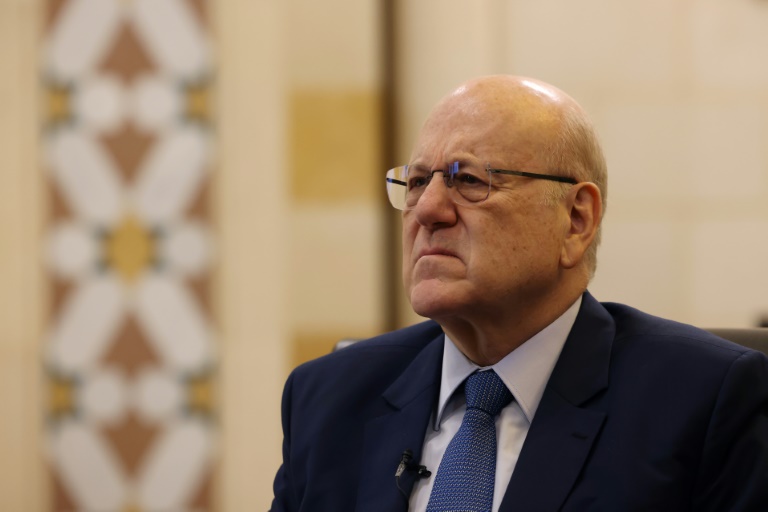Cash-strapped Lebanon unprepared as war threat looms

Lebanon is currently has no president and is being led by caretaker prime minister Najib Mikati.
Marjayoun – Lebanese emergency crews rush to the scene of Israeli bombardments in ageing vehicles and without protective gear as the crisis-hit country struggles to prepare for a possible war.
A gruelling, four-year-long economic collapse, widely blamed on the governing elite, has left Lebanon ill-prepared for another disaster, and volunteers and local authorities are scrambling to fill the gap with limited means.
Anis Abla, who heads the civil defence in south Lebanon’s Marjayoun area, said his fire and rescue service cannot afford flak jackets or helmets for his 37-strong team, most of them volunteers.
“We are the first line of defence, yet we have no equipment to protect ourselves,” Abla told AFP from his office, a container located less than 10 kilometres (six miles) from the Israeli border.
“If war erupts, we might not be able to secure enough water for our trucks or other basics like food,” he added.
Since Hamas carried out an unprecedented attack on Israel from the Gaza Strip on October 7, Israel has exchanged cross-border fire with the Iran-backed Hezbollah movement and allied Palestinian factions in Lebanon’s south, stoking fears of a regional spillover.
Israeli bombings have caused fires near the border, an area of trees and olive groves.
Hussein Fakih, head of civil defence for the southern Nabatiyeh region including Marjayoun, said his personnel had limited access even to water for fire trucks, as Lebanon’s chronic power cuts cripple pumping systems.
The newest vehicle is about 30 years old, said Fakih, who is responsible for 21 emergency centres.
He said fire trucks regularly break down and that “even if we get a puncture, we can’t get another tyre”.
“If the situation worsens… We will not be able to carry out all our tasks.”
– ‘Unprepared’ for calamity –
Since hostilities began, cross-border skirmishes have killed at least 62 people in Lebanon, according to an AFP tally, mostly Hezbollah combatants but also four civilians, including a Reuters journalist.
Most of Lebanon’s population now lives in poverty, but those who can are stocking up on food, medicine and fuel, or seeking alternate accommodation away from potential conflict areas.
Nearly 29,000 people have been displaced in Lebanon, according to figures from the International Organization for Migration.
Hasbaya mayor Labib al-Hamra said hundreds had fled to his town near Marjayoun from border villages, with at least 150 staying in an unfinished tourist hotel.
The municipality has had to rely on remittances from Lebanese abroad and charities for everything from rehabilitating the building to securing mattresses, food and medicine, Hamra told AFP.
The border tensions have revived memories of Hezbollah’s 2006 war with Israel that killed more than 1,200 in Lebanon, mostly civilians, and 160 in Israel, largely soldiers.
“My biggest fear is seeing a repeat of the 2006 scenario, but it will be even worse,” Hamra said.
He described municipalities’ finances as “very, very bad” and said “the Lebanese state… is unprepared to face this sort of calamity”.
– ‘Our state is dead’ –
Lebanon is facing the prospect of a new escalation while virtually leaderless, with the government operating in caretaker capacity and the presidency vacant for a year as bickering politicians have failed to reach a consensus.
Authorities have scrambled to develop an emergency plan, and Prime Minister Najib Mikati said on Monday he was doing his best to ensure the state, with its “humble means”, would be able to respond in case of war.
But Health Minister Firass Abiad warned Lebanon was facing unprecedented obstacles, including a lack of medical equipment and personnel.
“In 2006, we did not have drugs and medical supply problems,” Abiad told AFP. “We didn’t have a brain drain of medical professionals or a stifling economic crisis.”
He said his ministry needed between $30 million and $40 million for its own emergency response, mostly funded by repurposed World Bank loans but also $11 million in government credit lines.
“Lebanon is doing its utmost to increase its level of preparedness,” despite the difficulties, he added.
But many Lebanese have already lost faith in their government’s ability to shield them from tragedy, in a country still reeling from a catastrophic blast at Beirut’s port in 2020 that was widely blamed on negligence from officials.
Ali Khalil Awada, 74, was sheltering at the unfinished Hasbaya hotel with his wife in a narrow, meagrely furnished room.
He was displaced from his border village of Khiam several times during Lebanon’s 1975-1990 civil war, as well as during Israel’s 22-year occupation of the south and once more during the 2006 war.
But this time is “the worst” he said, adding “we can’t even afford bread”.
“Our state is dead… and our economy is gone.”
